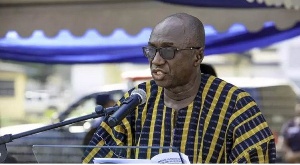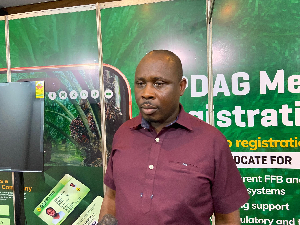Mr Ambrose Dery, the Minister for Interior, has said the proliferation of small arms, particularly, in wrong and unauthorised hands could undermine the peace being enjoyed by the nation.
He said it is important that Ghanaians did not take the peace for granted because political stability and accelerated socio-economic development were contingent on a peaceful environment.
Mr Dery was speaking at the Sixth Weapon Destruction exercise, undertaken by the National Commission on Small arms and Light Weapons, in collaboration with the security agencies, on Wednesday, in Accra.
The exercise was to destroy more than 2,700 illicit small arms seized at crime scenes and confiscated by the Law Courts.
This is to prevent them from being recycled into society and also to communicate the abhorrence of illicitly holding small arms to Ghanaians.
“The proliferation of illicit small arms has disturbed the political stability and democracy of some of our sister countries,” he stated.
“The safety, security and human rights of thousands of people have been impacted negatively, with socio-economic disruption resulting in human suffering and hardship.”
Mr Dery said the illicit arms were retrieved from criminals and those who had abused the terms of their small arms licenses and who possessed them without authority through the collective efforts of the security agencies.
He stated that weapon collection and destruction were part of the strategies for small arms control and management in society.
The Police, based on intelligence, retrieves and seizes illicit arms periodically through cordon and search and special operations.
Mr Dery said the devastating and unacceptable impact of the proliferation of illicit arms and light weapons was globally acknowledged, while the West African Region had had an unfair share of its menace.
The sector Minister, however, said the Government intended to make the country peaceful, safe and secure to promote development, make it an investment destination and attract direct foreign direct investment.
He noted that most civilians who possessed registered small arms had expired licenses; urging them to renew them to avoid falling foul of the law.
He also urged all those in possession of illicit arms to surrender them to the Police, failing which the law would catch up with them.
The Reverend Professor Paul Frimpong Manso, Board Chairman of the Small Arms Commission, said the threat of illicit proliferation of small arms and light weapons to communities required proactive measures to constantly prevent their easy circulation and accessibility, which fuelled armed violence, conflicts and human rights violation.
He said the destruction was one of the measures used in ensuring that illicit arms that were seized from criminals were destroyed to ensure that there were no chances of them getting recycled back into the society.
The destruction forms part of Government’s obligation under the ECOWAS Convention on Small Arms and Light Weapons and the UN Firearms Protocol, which require state parties to destroy obsolete and illicit arms seized or confiscated.
Rev. Frimpong Manso noted that out of ignorance most Ghanaians had acquired arms without finding out how to legally possess one.
He explained that for one to legally acquire and possess a weapon in Ghana, one must be 18 years and above, be of sound mind, physically fit to use the weapon, have a justifiable reason to possess one, a safe and secure place to keep it and be gainfully employed and have the requisite resource to possess same.
“The cumulative effect of this is that we would be building safer and secured communities, protecting the growth of our economies and sustaining our democracy,” he said.
He urged all to support the Commission and the security agencies in educating the public on the dangers of illicit small arms and the risks they posed to the peace, safety, democratic governance and socio-economic development.
“When we do our part as citizens by volunteering information to the Police, we would be helping the State to reduce the security budget and expenditure and those resources could be channelled into other social interventions that would benefit the marginalised and poor in society.”
General News of Wednesday, 7 November 2018
Source: ghananewsagency.org













